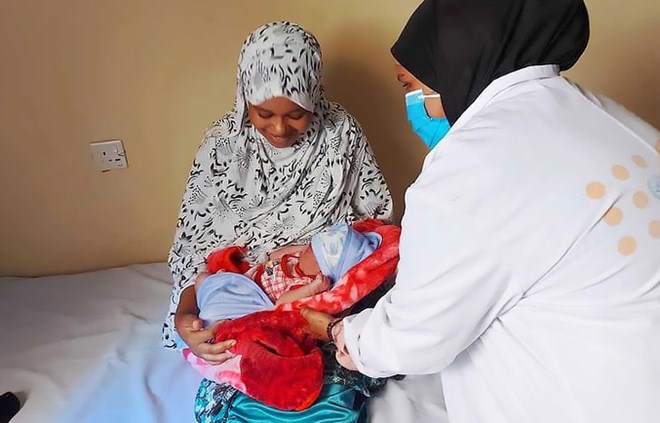
Thursday July 25, 2024

FILE - A healthcare worker assists a new mother and her newborn in a safe delivery at a healthcare facility in Somalia. Credit: UNFPA Somalia.
Mogadishu (HOL) — A new study by the Somali Institute for Health Research reveals that 43% of women in major Somali cities are still giving birth at home, despite the availability of healthcare facilities in these urban areas. The findings highlight a critical need for better maternal health education and accessible antenatal care services.
The research, published in the journal Frontiers in Global Women's Health, surveyed 430 women who had given birth in the last five years across 11 major Somali towns. The results show a significant disparity in birth settings, with only 57% of women utilizing health facilities for delivery.
Key Findings:
- 38% of women in Mogadishu and 53% in other major towns delivered their babies at home.
- Women with poor knowledge of the benefits of health facility deliveries were nearly four times more likely to give birth at home.
- Those who did not receive antenatal care or consultation about delivery locations were twice as likely to deliver at home.
- Financial constraints, long distances to healthcare facilities, and cultural preferences for home births were major contributing factors.
Naima Said Sheikh, a public health expert at the Norwegian University of Life Sciences and lead author of the study, emphasized the urgent need for targeted health education campaigns. "The high rates of home deliveries in urban Somalia are alarming. Our findings highlight the need for accessible and affordable maternal healthcare services," she said.
Policy Recommendations: The study calls for several policy interventions to address the issue:
- Strengthening primary healthcare through information, education, and communication activities to raise awareness about the benefits of institutional deliveries.
- Providing free antenatal care and delivery services for low-income families, given that Somalia's healthcare system is predominantly private.
- Implementing innovative solutions such as public-private partnerships, mobile health clinics, telemedicine services, and voucher programs to improve access to maternal health services.
The findings are consistent with trends observed across the Horn of Africa, where conflict, poverty, and inadequate healthcare infrastructure pose significant barriers to institutional deliveries. In conflict-affected regions of Ethiopia, for example, institutional delivery rates are similarly low, highlighting a regional health crisis.
Somalia has one of the highest maternal mortality rates in the world, with 692 deaths per 100,000 live births. The country's prolonged conflict and instability have severely impacted its healthcare system, limiting access to essential services for many women.
The study underscores the urgent need for a multi-faceted approach to improving maternal health services in Somalia, including educational initiatives, financial support, and improved healthcare infrastructure to ensure women have access to the necessary care during pregnancy and childbirth.